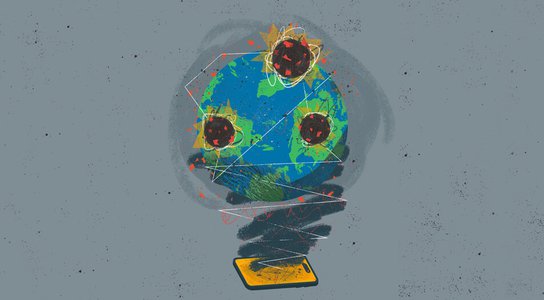The reality of the
climate crisis is an undeniable truth: average global temperatures are
increasing due to emissions of greenhouse gases released by human activities.
Rising temperatures bring with them increasingly frequent and severe weather events like droughts, wildfires and storms, devastating the natural world, people’s lives, and their livelihoods. The verdict is in, and the science is clear: we must take bold action to protect our world from the worst effects of climate change.
And yet, many conversations about the climate crisis are still stuck in a different reality, where urgency is minimised, and the science is called into question. This is in part because of climate disinformation.
Definition
Climate disinformation and misinformation refers to deceptive or misleading content that:
> Undermines the existence or impacts of climate change, the unequivocal human influence on climate change, and the need for corresponding urgent action according to the IPCC scientific consensus and in line with the goals of the Paris Climate Agreement
> Misrepresents scientific data, including by omission or cherry-picking, in order to erode trust in climate science, climate-focused institutions, experts, and solutions; or
> Falsely publicises efforts as supportive of climate goals that in fact contribute to climate warming or contravene the scientific consensus on mitigation or adaptation.
This definition was developed by Climate Action Against Disinformation.

More than just climate change denial
Often when people hear the term ‘climate disinformation’ they think of climate change denial – which argues that climate change is not real or that it is not caused by humans. But this is only one form of climate disinformation.
Increasingly,
those who are corrupting the conversation on climate use ‘distract and delay’
tactics to hold us back and delay action. These are subtler narratives but are no less damaging:
they do not deny the existence of climate warming, but instead
attack measures to combat the crisis, question the integrity of climate
scientists, and argue that environmentalists are alarmist.
You may have heard some of these narratives before:
- “Renewable energy doesn’t work”
- “Environmentalists are hysterical”
- “Net Zero is bad for the economy”
These misrepresentations have consequences.
Research shows that climate disinformation is a primary contributor to public polarisation over the climate crisis, and that it shapes public attitudes toward climate science. Individuals who are exposed to this kind of disinformation are less likely to support mitigation policies, hindering the ability of policymakers to take meaningful climate action.

Big Tech’s business model is amplifying climate disinformation
Increasingly, pundits and vested interests are polarising debate around climate action by using ‘culture war’ tactics to distort the conversation and divide public opinion. This division is abetted by the role of Big Tech in spreading and amplifying climate disinformation across social media.
The Big Tech platforms' toxic business model - which relies on surveillance and engagement for profit - encourages the spread of extreme and outrageous content, and can isolate individuals into ‘filter bubbles’ where they are not presented with information that challenges their existing world view.
In this environment, climate solutions become contested, obscured, and doubted - making it harder for campaigners, citizens, and scientists to make their case, and for politicians to be as bold as they need to be. Left unchecked, climate disinformation is altering the contours of political discourse.

We need to break through the filter bubble
Tackling the global challenge of the climate crisis requires cooperation. It requires citizens who are informed and engaged, and who are willing to back politicians who take the issue of climate change seriously. We need shared understanding, trust in the science, and a common sense of motivation and urgency to protect our planet.
2021 witnessed the Earth’s hottest month on record, deadly flooding in Germany and Belgium, a wildfire so large that it generated its own weather patterns, and a heat-dome in the Pacific Northwest that caused billions of shellfish to boil alive. As the IPCC’s most recent report makes abundantly clear, the climate crisis isn’t coming, it’s already begun.
To meet the magnitude of this moment, it is imperative that policy makers take swift and transformative action to mitigate the worst effects of the climate crisis. We cannot allow their ability to do so to be hindered by an information ecosystem that promotes climate disinformation and that drives climate sceptics toward more disinformation weakening public support for climate action and wasting time we don’t have.


